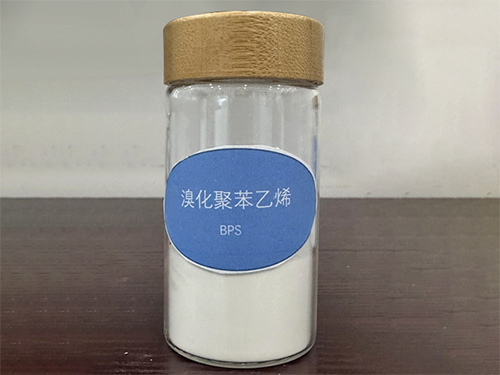Brominated Polystyrene
Structural Formula
CAS Number: 88497-56-7
Applications
Brominated Polystyrene (BPS) is a bromine-based organic flame retardant with excellent mechanical, physical, and chemical properties such as high flame retardancy, thermal stability, and light stability. It is widely used in engineering plastics such as PA6, PA66, PBT, PET, etc.
Brominated Polystyrene is mainly applied in thermoplastic resins such as PA, PBT, PET, etc., and requires combination with antimony compounds during use. When used in flame-retardant polyester, the addition amount of 10% (reinforced) to 17% (non-reinforced) can achieve UL94 V-0 rating (0.8mm), while for flame-retardant polyamide, an addition of 21% can achieve UL94 V-0 rating (0.8mm).
Brominated Polystyrene is made by brominating polystyrene and is primarily used as a flame retardant in engineering plastics. Since polystyrene (PS) is an engineering plastic, BPS has good compatibility with engineering plastics. It has minimal impact on the mechanical properties of materials, maintaining over 90% of mechanical performance. BPS is a macromolecular flame retardant with good compatibility with the substrate, it does not precipitate or migrate, and provides excellent anti-static properties without frosting on the surface.
Properties
Brominated Polystyrene is a white or light yellow powder or granule, with a bromine content of about 68%. It has a thermal decomposition temperature greater than 330°C and is characterized by a large molecular weight, good thermal stability, excellent dispersion and miscibility in high polymers, ease of processing, and no frosting.
Brominated Polystyrene is named based on its synthesis method as either Brominated Polystyrene or Polybrominated Polystyrene. From the name, it can be seen that Brominated Polystyrene is produced by brominating polystyrene. Polybrominated Polystyrene is made by first protecting the double bonds of styrene, brominating it, restoring the double bonds, synthesizing brominated styrene, and then polymerizing it. The process can also be divided into solvent-based and non-solvent-based methods. Since the solvent-based method consumes less bromine, it is commonly used for synthesis.
Advantages
Brominated Polystyrene (BPS) is an internationally recognized eco-friendly flame retardant that does not contain polybrominated diphenyl ethers or polybrominated biphenyls, and it complies with ROHS standards. It has advantages such as good compatibility with materials, no precipitation, no frosting, good electrical properties, minimal impact on mechanical properties, and low cost.


 About us
About us Products
Products Application
Application News
News

